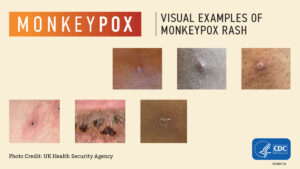A press release from Tulare County Health and Human Resources
 Tulare County Public Health has confirmed the first case of Monkeypox has been identified in a Tulare County resident. While the number of probable/confirmed cases is growing in California (186 cases) and the United States (791 cases), the risk of monkeypox to the general population is low.
Tulare County Public Health has confirmed the first case of Monkeypox has been identified in a Tulare County resident. While the number of probable/confirmed cases is growing in California (186 cases) and the United States (791 cases), the risk of monkeypox to the general population is low.
Currently, there are no reported deaths for monkeypox in California. Monkeypox spreads through direct, close contact with an infected person. The virus enters the body through broken skin (even if not visible), the respiratory tract, or mucous membranes (eyes, nose, or mouth) after skin or sexual contact, from bodily fluids, or contact with contaminated clothing or linens.
“It is important for our community to be informed on emerging public health threats like monkeypox; however, currently the risk to the general public is low,” says Dr. Karen Haught, Tulare County Public Health Officer. “The case is in isolation, recovering at home. We are actively investigating the circumstances surrounding this case, identifying close contacts, and notifying them of their potential exposure.”
Monkeypox is a rare disease that is caused by infection with the monkeypox virus. Monkeypox is of public
health concern because the illness can be spread from infected humans, animals, and materials contaminated with the virus. Symptoms of monkeypox may include flu-like symptoms, a rash on the face, extremities, or genital area that may look like pimples or blisters, fever, swollen lymph nodes, general body aches, or fatigue. People with a monkeypox infection may experience all or only a few of these symptoms. Most people with monkeypox will develop the characteristic rash.
Monkeypox can be passed to others from the time symptoms start until all sores have healed and a fresh layer of skin has formed, which can take several weeks. There are no treatments that are specific for monkeypox; however, in limited situations, vaccination (developed to prevent smallpox, a similar virus) may be recommended for those who may have been exposed to the virus.
“It is vital that persons who have symptoms or suspect they have monkeypox contact their health care provider right away,” said Dr. Haught. “There are many other causes of rashes, but it is always important to let your provider know you have a rash when scheduling an appointment.”
There are steps residents can take to reduce the spread of monkeypox and protect themselves from infection:
- Practice good hand hygiene often, with soap and water or alcohol-based hand rub
- Wear a well-fitted face mask when around others
- Talk with any new partners about their health before close or intimate contact
- Avoid close contact with people who are sick and their bedding, clothing, or other materials
- Stay home and call your provider if you are sick with any symptoms or have a new rash
- Stay aware if traveling to countries or large events where there are current outbreaks of monkeypox
Persons who believe they have been exposed to monkeypox or have symptoms of monkeypox should contact a health care provider as soon as possible. For more information about monkeypox, visit the Tulare County HHSA website at: tchhsa.org or the CDPH monkeypox informational webpage at: https://www.cdph.ca.gov/Programs/CID/DCDC/Pages/Monkeypox.aspx.
